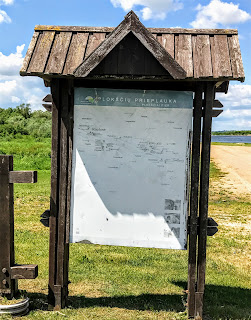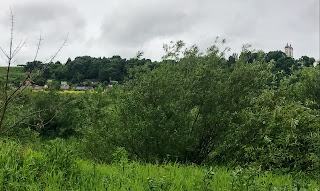We're up at 8:00, just in time to pack the tent dry, before the rains blow in. We gulp our breakfast, I
daven an abbreviated morning service, and then we're out, with storms threatening, roosters crowing madly, and a brisk tailwind adding to the steady current carrying us downstream.
Last night, Rosa and I watched a movie downloaded on my tablet.
A Tale of Love and Darkness is Natalie Portman's screen adaptation of Amos Oz's boyhood memoir, ending with his mother's suicide. It's especially poignant to watch inside a tent pitched deep in the Lithuanian countryside. Oz's father, Arieh, grew up here, raising cattle and vegetables with his family outside of Vilna. His mother, Fania, came from Rivne, in the Ukraine. As the young couple struggle to make their way in the parched and parochial desert of 1940s Jerusalem, Fania still yearns, tragically, for the lost romantic verdure of the Old Country, recalling her childhood nights sleeping out under the stars in the forests where her family and friends were murdered by the Nazis. I'd seen the film once before, but viewing it here gave flesh and blood to the pathos of Fania and Arieh's lives.
**********
An hour or so into the morning's paddle, the clouds thicken and the wind begins to shift direction, but we still have fairly decent paddling into Vilkija, where we arrive just as the downpour starts. We pull up at a riverside dock and make haste for a nearby park, where we take shelter under a grove of shady maple trees. We're a bit nervous about leaving the boat behind, but given the weather, don't expect many folks to be out by the river looking to steal a kayak. So when the rain lets up momentarily, we hike into town in search of the zydu kapines, the old Jewish cemetery. There are probably fewer Jews buried there than on the forested bluff beyond the edge of town, where the Nazis and their Lithuanian accomplices murdered residents of Vilkija and several other villages in the region, but that site is too far away to reach on foot, so I plan to leave an extra stone in the pre-war cemetery to honor the victims of the Shoah as well as those who preceded them in death in better, quieter times.



At nearly every turn along the stone pathways that wind through the park, we find splendid, totem-like wood-carvings, mostly sculptures of medieval local heroes and Christian religious figures. As we exit the park and veer uphill onto the main road into the village center, we spot a distinctive carving dedicated to Vilki's Jewish heritage, featuring an elegantly sculpted Torah scroll and Jewish star and a delicate rendering of one of the shtetl's two shuls. Here, as in so much of Lita, the local Jewish community divided along socio-economic lines. Raftsmen, wood cutters, and other blue-collar laborers prayed in a humble wooden kloiz while the rabbi and the relatively well-off merchants worshiped in the much grander building depicted in the wood carving.
But the carving honors all of Vilki's Jews, rich and poor, and tacitly acknowledges the single fate that swallowed them up in June of 1941. Seeing it standing sentry over the Nemunas against the ashen morning sky moved me to tears.
**********
Our map indicates that the old Jewish cemetery is around the corner from a well-marked local museum, so we followed signs up a hill and find. . . the museum. It's a pastoral, fairy-tale cottage, built over 300 years ago as a parsonage. In the late 19th century, it housed Antanas Juska, a local priest, folklorist, linguist, anthropologist and collector of all sorts of quirky art and memorabilia. It's now home to both his eclectic collection and a gallery of work by contemporary local artists, currently featuring luminous, folksy prints by a young Kaunas painter). We walk through, enjoying the idiosyncratic displays of books, bagpipes, dolls, phonographs, photographs, hand tools, and hanging geometric mobiles. It's fun to see, and, best of all, warm and dry.











As we near the exit, the docent, who speaks excellent English, leads us out to an enchanting sculpture garden. It's her husband's work; it turns out he is the wood carver who crafted the tribute to Vilki's Jewish community and all the other carvings scattered the village. She shares stories about Vilkija, this cottage and its residents--but alas, she knows nothing of the old Jewish cemetery. We walk around in the drizzle, searching the neighborhood, but with no luck and bad weather, we eventually give up and head back to the kayak. Along the way, we make a brief stop at a tiny corner market for coffee (for Rosa) and gummy bears (for both of us), and, when the heavens let loose, scurry for shelter at a covered bus stop. When we reach the boat, we bail out the rainwater and shove off in the Nemunas.
**********
The next ninety minutes of paddling are really tough: pounding rain, with ferocious headwinds churning big waves up and down the river. Before long, despite our raincoats, we're completely soaked, then exhausted, cranky, and bone-chilled. We've planned a lunch stop at a spot clearly delineated on the map as the Seredzius Pier; alas, in reality it doesn't exist. We find the town of Seredzius but it doesn't reach the riverbank; it's set back on a ridge at the forest's edge, separated from the river by a wide strip of marshy fields overgrown with thorns and nettles. There's no good place to pull over to eat, so we settle for a boggy, weed-infested bank opposite Seredzius's hilltop cathedral. Desperate for shelter from the raw wind, Rosa ducks behind a patch of brush, while I boil up tea and soup. This helps, as does removing our waterlogged pants. Ever so slowly, we warm up and regain our composure. Thankfully, the driving rain eases into a light mist.

I climbed up a nettle-covered ridge and look across the overgrowth to the village of Seredzius. Known in Yiddish as Srednik, it looks much like the other shtetlach we've passed on the Nemunas: its grand church built atop the bluff, surrounded by small wooden homes and a medieval hill fortress built by the Grand Dukes of Lithuania to defend against the crusading Teutonic Order. Situated thirty eight kilometers northeast of Kovno, Srednik was populated by Jewish peddlers, craftsmen, and timber merchants in the 18th century. By 1897, Jews comprised 71% of the local population of 1650 residents. Yet here, as elsewhere, in the late 19th and early 20th centuries, many left for the US and South Africa. By 1914, only 800 Jews remained. Most of them owned their own homes, where they kept productive gardens and orchards. Srednik's Jews traveled to Kovno by boat, as there were no land routes. Many were ardent Zionists. All were slaughtered, together with the Jews of Vilki, near the Pakarkles Forest, in August and September of 1941.
**********
I have a significant family connection to Srednik: my great grandmother, Toba Nakka (Tillie) Kagan was born here in April of 1868, to Reize and Notel Kagan. At 17, she married Rabbi Mendel Finkelstein and moved with him to Kovno. I wish I knew how they met! Perhaps it was an arranged marriage. My father never met either of his grandparents and even my grandmother, Janice Gutfreund Fink Denner, only met her in-laws once, very briefly. I've often wondered: Were Joe Fink(elstein)'s parents upset with him for leaving the fold of Orthodoxy to become a Reform rabbi? Was my grandfather embarrassed to introduce his progressive, American Jewish wife and kids to his Old World parents? Alas, I will never know.
Toba and Mendel had four daughters while living in Kovno: Fannie (born in 1886), Leah (1890), Helen (1891), and Sarah (1893). Their first and only son, my grandfather Joseph, was born in Springfield, Ohio in 1895. Two more American-born daughters followed: Clara in 1898 and "change-of-life" baby Rosella in 1909. Toba died young, at 64, on February 16, 1933. By then, she was a long time Dayton, Ohio rebbetzin who went by her Americanized name of Tillie.
**********
I leave a Boise river stone for Tillie and her neighbors, then Rosa and I press on, still damp but well-rested, with diminishing wind and rain. We pass by tiny Kriukai (in Yiddish, Krok) opposite Srednik, on the left bank. With its dense pine forest, it was, like Kulautova, a favored vacation spot for prosperous Kovno Jews who came in droves each summer by steam boat. As Pinkas Kehillot Lita notes:
Almost everyone who lived on the river banks owned a little boat, and for a payment of two kopeks carried people across the river to Seredzius on the opposite bank and back. A few lived by providing services to the vacationers who came in the summer.
**********
Thankfully, by late afternoon, the weather, as it so often does toward evening, takes a turn for the better. The sun makes a most welcome appearance and the water, so turbulent during the day, settles down smooth as glass. This provides for excellent paddling, so radically different from the soggy slog we've been through just a few hours earlier.
This journey offers a little of everything, often all wrapped up in the same day: relaxation and exertion, laughter, pain, struggle, celebration, kvetching and kvelling, fatigue and renewal.
In the luminous eventide hours, we paddle gently through placid waters under golden light, with a stop at the Veliuona pier, where we climb to the top of a fourteenth century hill fort. We revel in the marvelous view over the river: sunny, expansive, filled with European elegance and charm.
Shortly thereafter, we make camp, just past Veliuona. We bathe, eat, play gin rummy, and enjoy a spectacular 10:00 pm sunset, just before the rain returns, with us tucked happily into our tent. I hear tapping, thmp, thmp, on the rainfly, which does it work with blessed efficiency, keeping us warm and dry through many a deluge. We're hoping for sun tomorrow--our last full day before our Shabbat layover in Jurbarkas.







































































